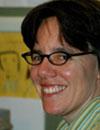![]()
Grown-Ups
Publisher Letter: Extending Family
After spending a few hours together at a wedding, three children threw their arms around each other and cried, “We’re cousins!” In a sense, they were; in a sense, they weren’t. Their story illustrates the importance children place on defining their families, and the role adults play in the process.
This month’s issue is all about the complexity of our family structures, and we provide literature, interviews, alternative family tree activities, and discussion questions to spark conversations about family with children and teens. Our children tend to have many adults in their lives who play various combinations of parental and biological roles. LGBT adults have families that are defined by choice as much as by biology or legal recognition. We’re all part of a general societal trend towards more varied family structures. This can raise a variety of issues, from what names we call our family members to the kind of social recognition and legal protections we receive. When my kids (who were two of the children mentioned above) and the stepson of my non-biological cousin (who was the third child) declared their relationship, and followed up the declaration with, “Our parents are cousins, so that means we are too,” it got me thinking.
Weddings are definitely what Abigail Garner terms “family defining moments.” They don’t just define the relationship of the married couple—they also highlight (and can help to cement) the relationships of those attending. My family (my wife, Sarah, and our two kids, Da’Jon and Tajah) traveled about 500 miles to attend the wedding. My cousin Catherine was getting married, and we thought it was important that we all be there. The lack of biological connection between my cousin and I didn’t make a difference.
What is a “non-biological cousin” you ask? In this case, she’s the daughter of one of my parents’ oldest friends, Vera and Ted. We spent every Thanksgiving and Christmas together, and called them Aunt Vera and Uncle Ted. As a child, I was unaware that other people generally got together with aunts, uncles, and grandparents. I’ve never talked with my parents or Vera and Ted about why they made this their tradition (though I can guess a bit—three out of the four adults were Jews who chose to celebrate Christmas) but I can say that, from my perspective, we’ve fulfilled the “aunt,” “uncle,” and “cousin” family roles for each other over the years.
Family definition came to my mind during the wedding, though. I realized I didn’t know if Catherine had any biological cousins. While I often say she’s my cousin, I decided that if anyone asked our relationship, I wouldn’t define it that way because there might be bio-cousins, uncles or aunts who would be offended.
So when my kids and Malik threw their arms around each other, I recognized the “cousin claiming” urge. Defining family is important when we’re children, and continues to be important throughout our lifetimes. As parents, we play a vital role in helping our children to do this. Race, religion, and ethnicity play an important role as well, as our cultural traditions are what bring us together as families. Negotiating (and helping our children to negotiate) any tensions in the family related to our LGBT identities is important. Supporting them in creating their own definitions of family, and the roles of birth parents, surrogates, sperm donors, and important adults is perhaps the most important of all.

